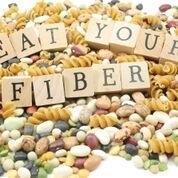Fiber for Health

It is a well known fact that fiber is very important for health, but many people do not know whether they are getting enough fiber in their diet. The truth is most of us don’t. In America, an average adult eats only 15 grams of dietary fiber in a day.
Women should get 25 grams of dietary fiber while men should get around 38 grams per day. This is based on the Institute of Medicine’s formula which recommends 14 grams of fiber for every 1,000 calories. One of the most important recommendations of the U.S. government's 2010 Dietary Guidelines is to include more of plant foods like vegetables, beans, fruits, whole grains, and nuts in the diet. Plant foods are rich in fiber and other nutrients that provide a number of health benefits.
Beans, peas, lima beans, soybeans, chickpeas, black-eyed peas, artichokes, whole wheat flour, barley, bulgur, cornmeal, bran, raspberries, blackberries, and prunes are all rich in fiber and form the top sources. Some other good sources of fiber include lettuce, dark leafy greens, broccoli, okra, cauliflower, sweet potatoes, carrots, pumpkin, potatoes, corn, snap beans, asparagus, cabbage, whole wheat pasta, popcorn, nuts, raisins, pears, strawberries, oranges, bananas, blueberries, mangoes, and apples.
Replacing white, refined varieties with whole grains will improve the fiber content of the diet to a large extent. According to dietary guidelines, at least half of the grains in the diet should be whole grains. Foods are better sources of fiber than supplements as they provide additional healthy nutrients.
Soluble and insoluble fiber
Fiber in food is classified into soluble and insoluble fiber. Soluble fiber dissolves partially in water while the insoluble form resists digestion and does not dissolve in water.
Soluble fiber is found in beans, peas, lentils, oatmeal, oat bran, nuts, seeds, psyllium, apples, pears, strawberries, and blueberries. It helps to lower the levels of LDL cholesterol, regulate blood pressure, and also lower the risk of heart diseases and type 2 diabetes.
Insoluble fiber or roughage, as it is commonly known, is found in whole grains, barley, couscous, brown rice, bulgur, wheat bran, nuts, seeds, carrots, cucumbers, zucchini, celery, green beans, dark leafy vegetables, raisins, nuts, grapes, and tomatoes. Insoluble fibers prevent constipation and reduce the chances of developing diverticular disease.
Studies have shown that total fiber intake can reduce the risk of heart diseases, metabolic syndrome, and obesity. Fiber-rich foods give a feeling of fullness and prevent overeating. These foods stay longer in the stomach and absorb water making you feel full.
Fiber is also known to lower the risk of certain types of cancer, including colorectal cancer and gastrointestinal cancer. Fiber in association with other nutrients works to provide protection against cancer.
Ways to add more fiber
Here are a few tips to add more fiber to your diet:
- Have a breakfast of whole grain cereal that contains at least 5 grams of fiber. Ensure that the product contains any one of the whole grains, whole wheat, whole oats, or whole rye, as the first ingredient.
- Choose products containing at least few grams of fiber in one serving. Foods containing 2.5 to 4.9 grams of fiber in one serving is considered to be a good source of fiber. An excellent source of fiber is one which contains 5 grams or more fiber in a serving.
- Use whole grain bread with at least 2-3 grams of fiber for sandwiches.
- Always have a whole fruit instead of fruit juice. A fruit has twice as much fiber as a glass of juice.
- Add beans to a variety of dishes and opt for beans instead of meat in one meal per week.
- Try new cuisines, like Mediterranean and Indian, that use more whole grains and beans.
- Enjoy snacks with lots of fiber like vegetables with bean dip or hummus.
Some people are worried that suddenly increasing their fiber intake may cause gastrointestinal disease. Increasing the content gradually will prevent gas, bloating, and digestive issues. Drink plenty of water as fiber absorbs a lot of water.


![[Infographic] 6 Foods High in Fiber You Should be Eating](https://www.findatopdoc.com/var/fatd/storage/images/_aliases/small_square/top-videos-and-slideshows/foods-high-in-fiber/654501-1-eng-US/Foods-High-in-Fiber.png)











